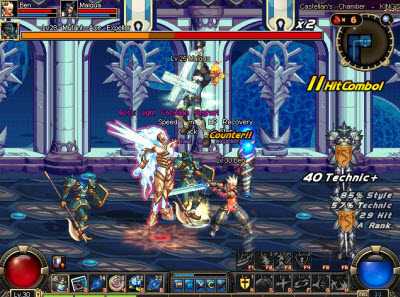
The Asian game makers argue that their “free to play” business model makes more sense in the recession. These games are free at the start, and players spend money only when they want to buy items such as better weapons that make their characters stronger.
[aditude-amp id="flyingcarpet" targeting='{"env":"staging","page_type":"article","post_id":133549,"post_type":"story","post_chan":"none","tags":null,"ai":false,"category":"none","all_categories":"business,games,","session":"B"}']This holiday season will be an important test in the market for free-to-play games in the U.S., says Min Kim, vice president of marketing at Nexon America, in an interview. Either the free-to-play, Asian-style online games will continue to gain market share, as they have all year, or the console game companies will come back with a vengeance.
Virtual goods-based free-to-play games are taking off on Facebook. But it’s still an open question whether such games are going to take off in the broader online games market, which has been dominated in the U.S. by subscription-based games where players pay a monthly fee.
AI Weekly
The must-read newsletter for AI and Big Data industry written by Khari Johnson, Kyle Wiggers, and Seth Colaner.
Included with VentureBeat Insider and VentureBeat VIP memberships.
Nexon America is pushing the boundaries further with Dungeon Fighter Online, (pictured at top) a new free-to-play game that formally launches on Oct. 22 in North America. That game launched in South Korea in 2005 and now has 10 million registered users. It brings fast-action, arcade-style combat to the fantasy role-playing genre. Dungeon Fighter Online is already available in an open beta, and the results are looking good, says Kim. By year end, Nexon will also launch its Block Party social network and portal for online gamers. That service is meant to make free-to-play games more sticky, meaning it tries to make gamers more loyal by hooking them up with friends.
It will be interesting to see if Dungeon Fighter Online can achieve traction even as big console games launch in the U.S. in the run up to the holiday selling season. It’s exactly the kind of game that could help the online game market gain share against the console makers.
But while MapleStory has proven to be a worldwide hit, the American market has been tough to crack. Kart Rider, a racing online game that was a big hit for Nexon in Korea, was released in a closed beta in the U.S. two years ago. But American gamers didn’t respond, and the game was shelved.
“People pointed at Kart Rider and said that Asian games don’t translate,” Kim said. “But it’s not as simple as that.”
[aditude-amp id="medium1" targeting='{"env":"staging","page_type":"article","post_id":133549,"post_type":"story","post_chan":"none","tags":null,"ai":false,"category":"none","all_categories":"business,games,","session":"B"}']
Kim credits a generational change that is leading the way. Kids who were born in the dotcom bubble days are now using Disney’s online game, Club Penguin. They’re accustomed to the mouse and keyboard thanks to YouTube and Facebook. And they’re playing free online games like Sony’s Free Realms, which has gained around five million users since its launch in April.
“The computer screen takes up a lot more of their free time,” Kim said.
The problem in the past was that game publishers offered only “big dinners” for gamers. Nobody focused on the light snacks. Those games are becoming more plentiful now, but the relatively slow speed of broadband in the U.S. is hurting the bigger online games. American gamers have slower connections and so they’re not as willing to wait for a long download before they play a game. Some solutions — such as the Unity Technologies 3-D game engine, which allows fast 3-D games to be played in browsers with minimal downloads — are helping the U.S. market.
[aditude-amp id="medium2" targeting='{"env":"staging","page_type":"article","post_id":133549,"post_type":"story","post_chan":"none","tags":null,"ai":false,"category":"none","all_categories":"business,games,","session":"B"}']
Another barrier in the U.S. was where gamers play. In Korea and China, gamers play in Internet cafes, where it’s easy to find someone to teach you how to play. American gamers have to learn to play the games by themselves or by talking to friends over online connections.
American game publishers are responding to the success of their Asian counterparts with new online games. But in markets such as China, domestically-produced games still dominate the market, with the exception of Activision Blizzard’s World of Warcraft fantasy role-playing game, which has about 12 million subscribers worldwide. Likewise, the Chinese game companies such as Perfect World are beginning to launch their online titles in the U.S.
The result is going to be an extremely competitive market, both in the U.S. and in Asia. U.S. companies such as Outspark, Electronic Arts, THQ, Take-Two Interactive, NCSoft and lots of startups are launching free-to-play online games both here and abroad. EA has taken the biggest steps, launching online versions of sports games in Asia and launching Battlefield Heroes, a free-to-play online combat game, in Western markets.
[aditude-amp id="medium3" targeting='{"env":"staging","page_type":"article","post_id":133549,"post_type":"story","post_chan":"none","tags":null,"ai":false,"category":"none","all_categories":"business,games,","session":"B"}']
Lots of publishers aren’t sharing their revenue numbers yet. In 2007, revenues for the free-to-play online game market were probably around $30 million in the U.S. Now, if you count revenues of social games on Facebook, the number has blossomed to hundreds of millions of dollars. Kim said the challenge for free-to-play online games is that it isn’t as easy to convert players from free to paid play compared to social games on Facebook.
“The barriers are coming down,” Kim said. “I feel like we are on the ground floor of a market that is just beginning to take off.”
VentureBeat's mission is to be a digital town square for technical decision-makers to gain knowledge about transformative enterprise technology and transact. Learn More
